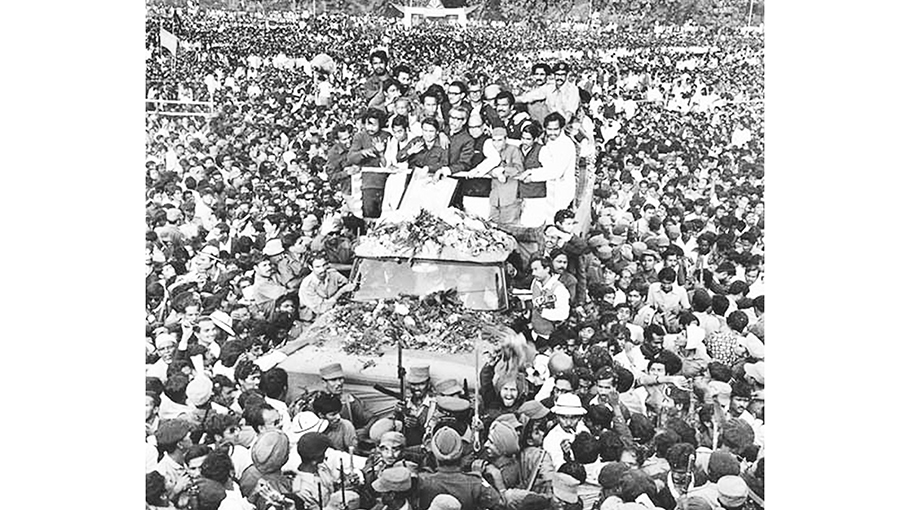The return of the saviour
The Independence, dreams of millions of people, came true under the leadership of Bangabandhu Sheikh Mujibur Rahman, the greatest Bengalee of all time

Though the victory through the nine-month-long sanguinary War of Liberation was achieved defeating Pakistan occupation forces on December 16, 1971, the whole nation was awaiting the return of the Father of the Nation Bangabandhu Sheikh Mujibur Rahman from the prison in Pakistan.
To the nation the independence was, as though, incomplete without the presence of the Bangabandhu. People got restive in the absence of the Bangabandhu among them because he was the sole source of inspiration to them. He sacrificed a long 23 years of his life for the emancipation of the Bengalees from the yoke of the Pakistani colonial rule. He was the liberator of the Bengalees who dreamt of freedom since thousands of years. And in realising the dream of the nation he suffered immense tortures physically and mentally at the hands of the then rulers.
The nation’s expectations were fulfilled and people got the real taste of the victory with the homecoming of the Bangabandhu on January 10 in 1972.
The historic Homecoming Day of Father of the Nation Bangabandhu Sheikh Mujibur Rahman, the greatest Bangalee of all time, is being observed today across the country in a befitting manner.
Bangabandhu, the undisputed leader of the nation and supreme commander of the country's Liberation War, returned to the sacred soil of independent Bangladesh via London and New Delhi on January 10 in 1972, after 290 days of confinement in Pakistan jail.
On the occasion, President M Abdul Hamid and Prime Minister Sheikh Hasina issued separate messages paying glowing tributes to the Father of the Nation on Sunday.
Father of the Nation Bangabandhu Sheikh Mujibur Rahman's Birth Centenary Celebration National Implementation Committee has chalked out elaborate programmes to observe the day.
A programme titled 'Father of the Nation in Independent Country (Mukto Swadeshe Jatir Pita)' will be live broadcast on all television channels, online and social media at 3pm today from Shaheed Manirul Alam Auditorium of the Bangladesh Television.
Bangabandhu's daughter Prime Minister Sheikh Hasina will chair the programme virtually joining from her official residence Ganabhaban in the city.
Poems of Sheikh Rehana, Bangabandhu's younger daughter, composed on her parents will be recited at the function while a discussion on the significance of Bangabandhu's homecoming will also be held.
On the night of March 25, 1971, Pakistan army arrested Bangabandhu from his Dhanmondi residence and sent him to a West Pakistani jail the following day.
Bangabandhu was subjected to inhuman torture in the Pakistan jail where he had been counting days for the execution of his death sentence that was pronounced in a farcical trial.
"I was a prisoner in the condemned cell awaiting hanging. From the day I went into jail, I didn't know whether I would be alive or not. I was mentally ready to die. But I knew Bangladesh would be liberated," Bangabandhu spoke emotionally about his ordeal in Pakistani prison at a news conference in London.
About the Pakistan army's genocide on Bangalees, Mujib said: "If Hitler had been alive today, he would have been ashamed."
Earlier, on March 26 in 1971, Bangabandhu proclaimed independence of Bangladesh and urged people from all walks of life to participate wholeheartedly in the nation's War of Liberation.
On reaching Dhaka (Tejgaon) airport in the afternoon on January 10, Bangabandhu was greeted by tens of thousands of jubilant people. It was an ocean of human heads eagerly waiting to have glimpse of their beloved leader since the victory on December 16 in 1971.
From the airport Bangabandhu was escorted to the Racecourse Maidan (now Suhrawardy Udyan) where he addressed a spontaneous reception accorded to him by as many as one million cheerful countrymen.
He recalled with deep respect the contribution of all during the war and urged the people to rebuild the war-ravaged country.
Bangabandhu took the oath of office as the country's Prime Minister on January 12, 1972.




